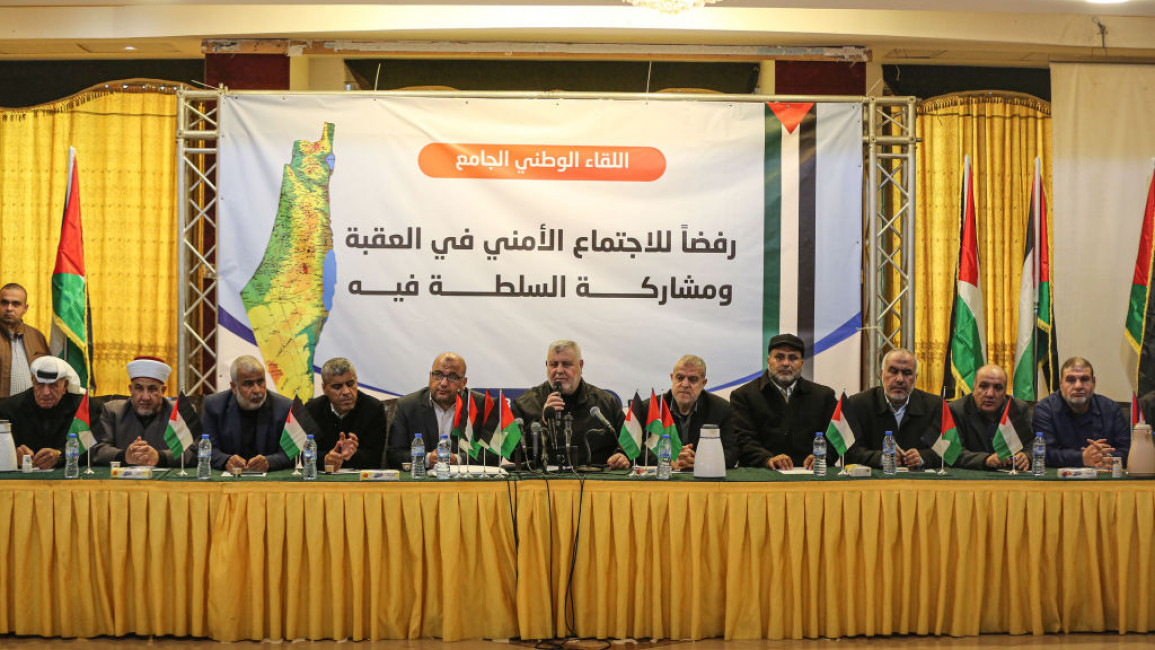No coordination with Israel on West Bank security, says senior Palestinian figure after Aqaba talks
The secretary general of the Palestine Liberation Organisation, Hussein Al-Sheikh, has dismissed reports that Israel and the Palestinian Authority had agreed to resume security coordination in the occupied West Bank following Sunday's controversial meeting in Jordan.
The meeting, at the Red Sea port city of Aqaba, came amid one of the worst outbreaks of Israeli violence against Palestinians in the West Bank in recent memory.
A joint statement from the Israeli and Palestinian delegations in Aqaba said there had been an agreement from both sides to "end unilateral measures".
Almost immediately after the meeting, senior Israeli ministers said West Bank settlement expansion and approvals would continue, despite the pledge.
Al-Sheikh, frequently described as the second-in-command of the Palestinian leadership and tipped to succeed President Mahmoud Abbas, told The New Arab’s Arabic-language sister site Al-Araby Al-Jadeed that no definite outcomes emerged from the meeting.
"We did not reach any final understanding or agreements," he said.
The Palestinian Authority stopped its security coordination with Israel in late January, over Israel’s escalating aggression against Palestinians in the occupied West Bank. More than 60 Palestinians in have been killed by Israeli security forces in the occupied West Bank since the start of 2023.
There had been reports that the PA had agreed to resume security cooperation with Israel, including working together against what Israel considers to be "terror" groups - but Al-Sheikh said no such thing could happen until Israel stopped its "unilateral measures".
This includes the construction and approval of settlements, considered illegal under international law, in the occupied West Bank.
"The Palestinian side did not make any concessions. The halt on security coordination is still in place because this is linked to Israel's implementation of stopping unilateral measures," he said.
"We informed Israel, the Americans, and everyone that we will not share functionally with Israel in the issue of security in the West Bank… either we take full security responsibility in accordance with the agreements, or Israel continues as an occupying power."
He told Al-Araby Al-Jadeed that no new agreements had been reached by the two sides on security or in other fields.
"No security plan was presented at the meeting, Palestinian, American or otherwise," he said.
Further work into an agreement would be done at a meeting in Egypt's Sharm El-Sheikh on 17 March, he said.
There had been considerable Palestinian opposition to the Aqaba meetings, with some factions calling the Palestinian leadership's participation a "betrayal".
But Al-Sheikh claimed that there had been "almost unanimous" agreement among the Palestinian leadership that the meeting needed to take place, to end deadly Israeli attacks.
Violence has only worsened since the Aqaba summit, with settlers going on a rampage in cities in the West Bank, setting buildings and cars ablaze in mayhem not witnessed for years, resulting in one Palestinian dead and several hundred injured.
Al-Sheikh said that any potential agreement with Israel would only emerge if guaranteed by the US, Egypt, and Jordan, who brokered the Aqaba talks.
Further work towards an agreement would be done at a meeting in Egypt’s Sharm El-Sheikh on 17 March, he said - although he expressed doubt that Israel would follow up on any deal.
"Our position is clear, to completely stop settlements in East Jerusalem and the West Bank. This is our demand in the meeting," he said.
"I do not trust that they will implement what they said in Aqaba. This is not the first agreement or understanding between us and them."


![President Pezeshkian has denounced Israel's attacks on Lebanon [Getty]](/sites/default/files/styles/image_684x385/public/2173482924.jpeg?h=a5f2f23a&itok=q3evVtko)



 Follow the Middle East's top stories in English at The New Arab on Google News
Follow the Middle East's top stories in English at The New Arab on Google News


